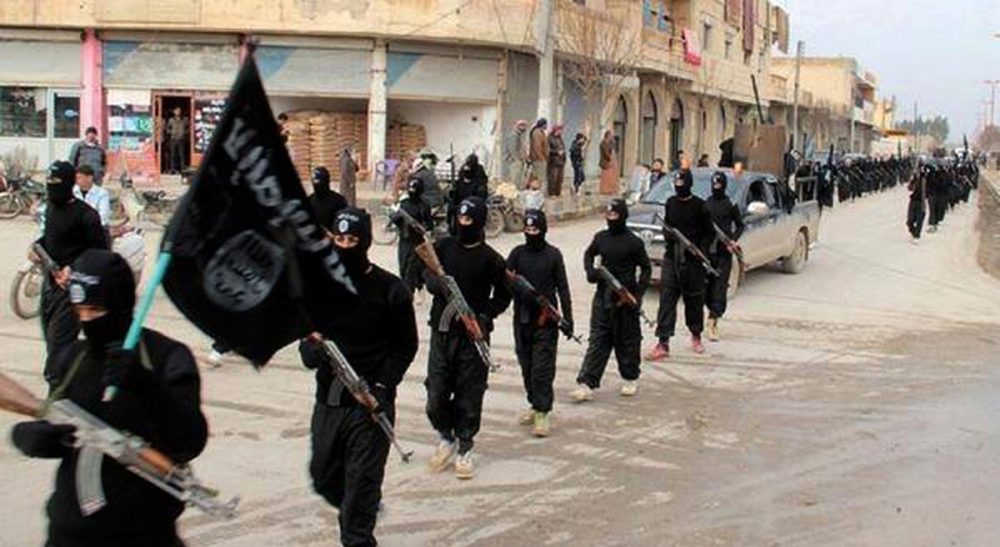Advertisement
Brutality Is Not Capability: A Guide To Understanding ISIS

In a summer seared by violence — from Gaza to Ukraine — one murderous group has stood out among all others: the Islamic State in Iraq and al-Sham, also known as ISIS.
The group has demanded attention both because of its surprising successes and because of its nearly unprecedented barbarism. The beheading of American reporter James Foley last week was just the latest in a series of unspeakable abominations that have allegedly included crucifixions and burying people alive.
ISIS is not a state. It is a sub-national organization. As such, it lacks the resources and power that come with being a sovereign government.
The group that was kicked out of al-Qaida for being too brutal has certainly caught the attention of the U.S. government. Monday night's announcement by the White House that the U.S. will increase surveillance flights in Syria follows statements by the president and top defense officials suggesting that Washington has shifted its stance and has placed new emphasis on defeating ISIS (which the U.S. government refers to as ISIL).
Many who study international security are advising caution, however. Brutality should not be confused with capability and the fundamentals that were in play prior to the American journalist’s murder have not changed. ISIS is a violent, non-state actor and like any group, it has strengths and weaknesses. To assess the threat and formulate a strategy to defeat it, it would helpful to be clear about those strengths and weakness are.
Strengths
Up until about a week ago (more on that later), ISIS was on a roll. It took large swaths of Iraqi territory and won battles against the Iraqi army and the Kurds. Success on the battlefield brings advantages. ISIS now enjoys ideological momentum. It is seen as the top dog among violent extremist groups, even outshining its mentor, al-Qaida. This brings attention and with attention, recruits. And by overrunning the Iraqi army, it has also acquired useful assets, including U.S.-made weaponry, money deposited in abandoned banks and even an oil well. More people, more capable weapons, more cash. All good things if you want to be a successful terrorist.
Weaknesses
ISIS also has several weaknesses. Some are structural, and some are, ironically, a product of its success. To begin with, ISIS is not a state. It is a sub-national organization. As such, it lacks the resources and power that come with being a sovereign government. As armies go, it is rather small. Estimates put it at between 10,000 and 20,000 fighters. Those fighters must defend the huge amount of territory it acquired, and it must do so against multiple enemies on multiple fronts.
Its success has not only meant more territory to defend, but that more nations are joining the fight. It was already fighting Bashar Assad in Syria and non-ISIS rebel factions, including other pro-al-Qaida rebel groups in Syria. Then it picked a fight with Iraq and another one with the Kurds. Now the U.S. has put it in its sights, Iran is joining the fray against it, and Britain and France as considering what they may do.
It won its early fights, because its opponents were incompetent (Iraq) or outgunned (Kurds). The Kurds are now receiving weapons, enjoy air support from the U.S., and are taking back territory. Iraq, with Nouri al-Maliki finally gone, is starting to get its act together, even if the process is tenuous. Last week was ISIS’s worst week on the battlefield, since the summer began.
Future Prospects
ISIS is a committed, savvy, well organized — and now, a well-resourced group. It could very well bounce back from its recent reversals on the battlefield. Its most important assets are the decrepit, corrupt and predatory governments in the region. It can only hope that Iraq does not reform and instead continues to alienate large numbers of its own citizens to such an extent that even a violent foreign force seems preferable. That is not a terrible bet on ISIS’s part.
But as the recent history of Iraq shows, ISIS may face its own internal political challenges. How long will the Iraqi Baathists (Saddam Hussein’s old gang) and the Sunni tribes stick with their new ISIS friends? If the new Iraqi government credibly reaches out to these groups, and if ISIS’s penchant for violence alienates the locals, this marriage of convenience will end in divorce.
Missing The Point
So far, the American discussion of ISIS has largely missed the point. It is one part overreaction, understandable in the wake of an American journalist being murdered and served up on social media. And it is two parts partisan name-calling. Watching cable news, one would think the only issue was whether President Obama should have sent guns and money to so-called “moderate” Syrian rebels earlier — a speculative discussion unbothered by facts. (The data suggests it would not have mattered.)
What is happening in the Middle East is first and foremost a function of the governments in the Middle East and their policies. If we want to stop ISIS and achieve regional stability, then we have to start there.
What goes undiscussed is that our Saudi and Gulf friends fund and feed extremists that ending up joining groups like ISIS. Meanwhile, Turkey provided safe passage for new recruits to travel into Syria to join the jihad. And, frankly, the real threat here is not even ISIS. As I have written here before, it’s the rising sectarian war in the Middle East, a war that pits Sunnis against Shi’a (and religious minorities). ISIS is but one part of that. Add a sectarian war together with regional rivalries (Saudi Arabia vs. Iran), and a mix of authoritarian and broken states, and one of the cornerstones of American foreign policy — “stability” — looks like it’s in deep trouble. Worse still, it is not at all clear where this is going or how it ends.
As we focus anew on ISIS, we would do well to avoid the hype (I’m talking to you Gov. Rick Perry), look dispassionately for its weaknesses, and stop the silly, myopic focus on “isn’t this Obama’s/America’s fault?” What is happening in the Middle East is first and foremost a function of the governments in the Middle East and their policies. If we want to stop ISIS and achieve regional stability, then we have to start there.
Related:
